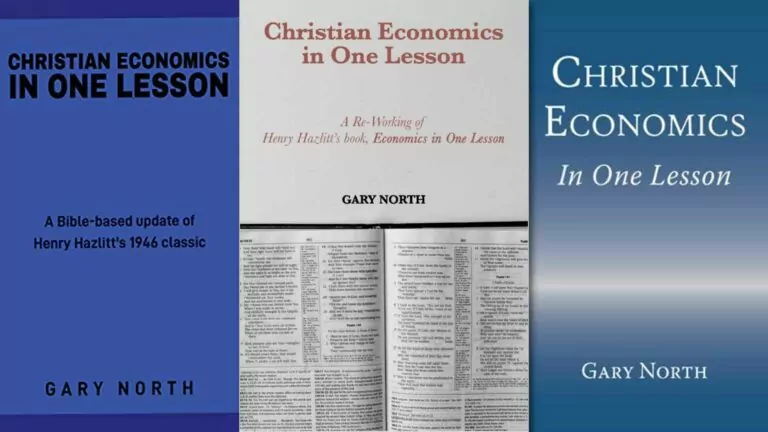by Gary North
2015 / 268 pages
Henry Hazlitt’s Economics in One Lesson is what its title suggests, just one economic lesson explained in the first chapter – that we focus on the obvious impact of a government program, and don’t consider what otherwise might have happened with those dollars. It’s the seen vs. the unseen. That one lesson is then repeatedly applied to different situations in the 24 chapters that follow. In chapter 4, it is applied to public work projects: when the government builds a new sports stadium we can see the job created by its construction. What’s unseen is all the jobs that might have been created by businesses if they hadn’t had to pay the taxes to build that stadium. Overall, Hazlitt is making a general argument for less government and more economic freedom, but is making it on the basis of practicality: that a free market approach will make us all, overall, more prosperous (download the book for free).
Effectiveness is the fruit, not the goal
In his Christian Economics in One Lesson, Gary North makes his argument for free market economics on a very different basis: obedience. He also thinks the free market is the most effective way of making us all richer, but he sees that, not as a goal, but as a side effect – the fruit – of being obedient to God’s commands do not covet, and do not to steal.
As his title suggests, he is riffing off of Hazlitt, and his chapters are a reworking of each of Hazlitt’s. Economics is sometimes treated as a being simply about the math, about some sort of neutral accounting, pitting the different economic systems against each other to find out which creates the greatest benefit for society. Both socialists and capitalists could even agree that economics is about dealing with the problem of scarcity – there is only so much to go around, so how do we make the most of it?
But North is arguing that economics is really a matter of ethics, and applying God’s guidance on money, work, property, and covetousness to the real world. Then the better way is the way that obeys God’s commands. Now, like Hazlitt, North thinks the best system is the free market, and not the sort of so-called capitalism that involves getting government contracts and special favors. None of that crony “capitalism.” This is, instead, a free market where people make exchanges voluntarily, and consequently, both sides benefit.
No temptation to tweak
But even as Hazlitt and North both hold to the free market system, it is significant that they got there very different ways. Hazlitt got there because the free market works – it is the most prosperous of all systems, doing more to raise people out of poverty than any other economic system before it. North arrives there because the free market is what results when we are obedient to God, respecting our neighbor’s property and pushing back against our own covetousness.
So, both support the free market. But for those like Hazlitt who arrived there for practical reasons, there will always be the temptation to tweak, and in doing so, to succumb to socialism. If capitalism works best, who’s to say if capitalism plus just a smidge of socialism might not be better? Maybe just 5%? Or 10? How can we know unless we try?
But there isn’t the same temptation to tinker for Christians who choose the free market for its alignment with God’s Word. We won’t want to be 5% or 10% less obedient. And it is worth noting it is no coincidence that the economic system that most aligns with God’s Word is also the one that best raises people out of poverty. That’s simply God’s love – He knows what is best for us, and when we obey, especially when we do so on a societal level, it goes better for us.
Conclusion
North’s insight – that economics is about ethics, not efficiency; it is about obedience, and not prosperity – is a brilliant one, and worth the reinforcement that comes in the repeated applications that follow. If this isn’t the most important book I read last year, it is certainly in contention… and it can be downloaded for free here.












